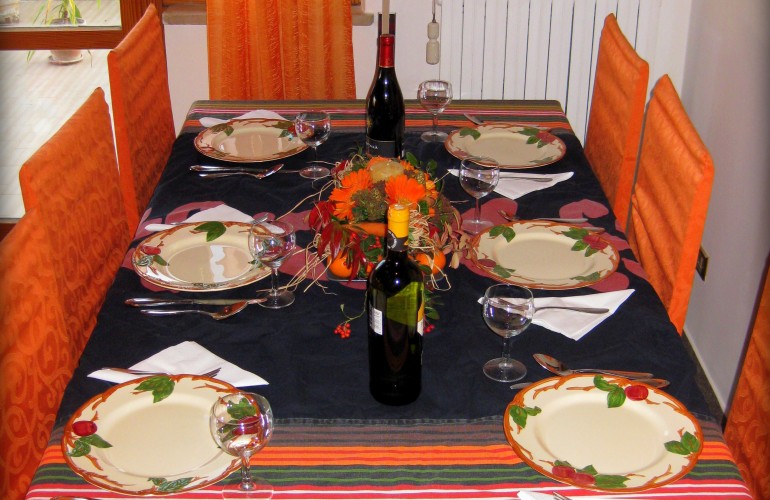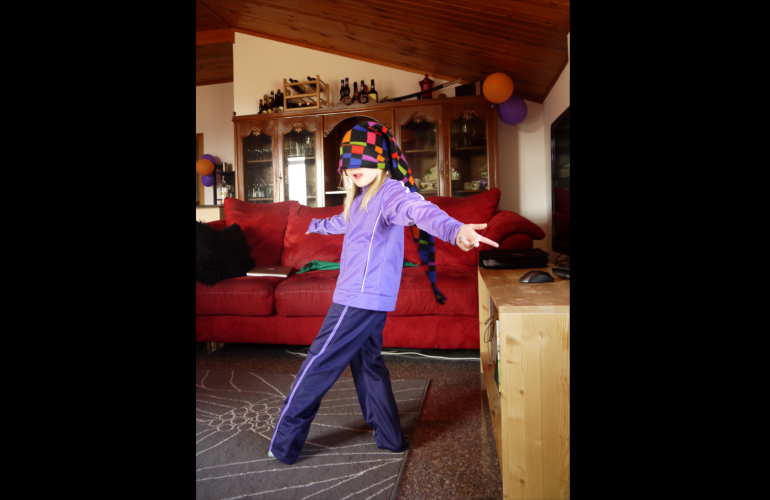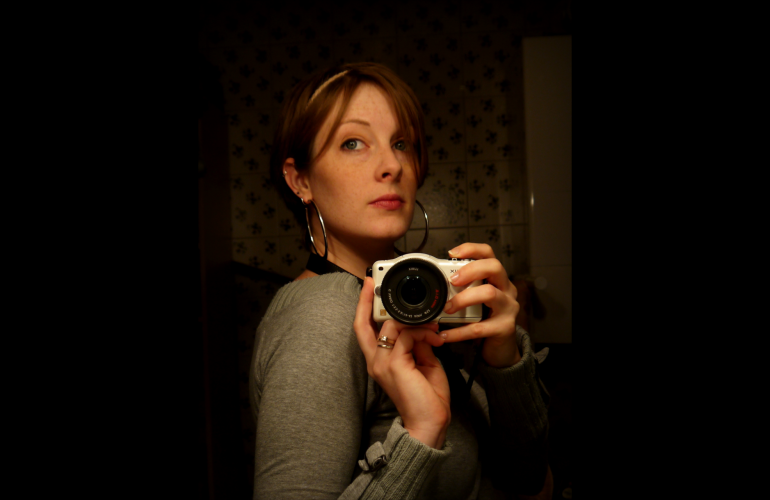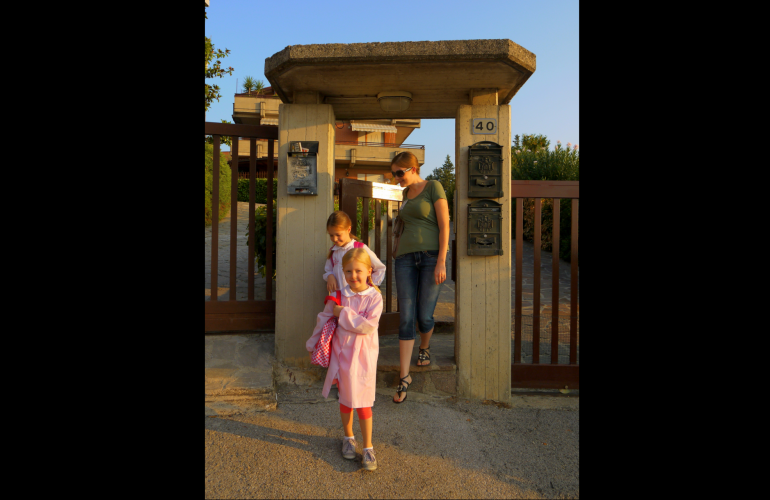The speaker this past Sunday morning came as close as anyone ever does in our quiet Italian-Brethren church to thundering from the pulpit. My ears, grown allergic over the decades to Preacher Voice, clamped down in a protective gesture around my mind so that I only caught snatches. Something about how the people sitting in the back were showing indifference to God. Something about the proper protocol for coming to meet with the King. Something about all those noisy children, the heads of households not taking enough control.
I didn’t hear any more; I just saw. White, then red, then white again. The speaker’s words had flown direct as an arrow from his front-row domain to my pew in the family section at the back and pierced old wounds of mine with uncanny precision. I might have gotten up and walked out if that wouldn’t have seemed to reinforce his point. Besides, far too much attention was already being directed to the back, to We The Young Parents, to we the irrelevant and the irreverent. The last thing I wanted was additional scrutiny. I just wanted the Sunday morning spotlight to lose its fixation on me.
For a university writing class nearly ten years ago, I wrote a poem called Preacher’s Kid. I cringe now at how one-dimensional and bitter it comes across, but the creative exercise provided relief that I dearly needed at the time. In it, I strung together the many dos and don’ts that had dictated my childhood behavior at church. Clothing, facial expressions, speech, movements—every last detail of appearance was accounted for and regimented under the eyes of God. If I didn’t wear a frilly enough dress or if I ran in the hallway or if I didn’t sit close enough to the front or if my younger siblings made noise while in my care, it was counted unto me as unrighteousness, a personal affront to the King we had come to impress.
No matter how many times I heard 1 Samuel 16:7—“Man looks at the outward appearance, but the Lord looks at the heart”—I sensed that it didn’t hold any water inside our church doors. Appearance was everything when it came to communal encounters with God. Wear the wrong thing or use the wrong jargon or lift your hands during the wrong song, and you could dismantle the painstakingly curated spiritual atmosphere in one fell swoop. And we children, with our high energy levels and short attention spans, were the worst offenders. At least, that’s how I understood things. It’s hard to sort out in retrospect which guiding principles of my childhood were church policy, which were merely the opinions of church members, which were unique to my fundamentalist family, and which were constructs of my own vivid imagination. The result was the same however: I felt welcome in church only if my appearance fit a particular mold.
Do you know what that kind of thinking can do to a young girl? How deeply it can lodge the barbs of conditional love into her frame of reference? How much anxiety and shame it can infuse into her perception of God?
I could recite dozens of New Testament passages from memory as a girl, but only as an adult did I start to catch sight of their protagonist. Jesus, teaching his followers to approach God with as much simplicity and honesty as they could muster. Jesus, holding up the disruptive children his helpers had shooed away as examples for the adults to follow. Jesus, scandalizing the religious community by choosing people over protocol. Jesus, encouraging soul-thirsty crowds to stop worrying about what to wear.
The Jesus I found in adulthood gave me permission to unlearn all those crushing childhood lessons about God and love and religious etiquette. Still, old habits die hard, and I’ve never stopped having to consciously shrug off appearance anxiety when I walk into a church. Sometimes, fellow churchgoers help me shed that burden more easily with their wide-flung smiles, the way they dote on my girls, or their delighted off-pitch singing. Other times, well-meaning congregants can make things worse, such as when they pointedly insist that I study up on Christian modesty or when they rate my devotion to God by my proximity to the stage.
In my six years here, I can’t recall seeing Sunday morning’s speaker ever sit in the section of the auditorium that has him so fired up… but I have logged plenty of services in those back few pews, and when I look around me, this is what I see:
I see babies—fussy babies, giggling babies, babies trying to share slobbery bites of cookie with each other, babies shrieking with the joy or indignation of any given moment, babies missing their naptimes, babies who want more than anything in the world to try out their awesome new walking skills on the center aisle. (Every once in a blue moon, I’ll even catch a baby sleeping. Their heads of household always look distinctly relieved.)
I see children intent at work on coloring books, children singing along to hymns they only half know, children like my serious-minded eight-year-old absorbed in storybooks, and children like my energetic five–year-old dropping Zoobles under the pews and occasionally forgetting to whisper. I see children quietly snuggling with their parents and children vibrating with pent-up enthusiasm. I see children who picked out their own outfits for church.
I see their parents—moms rocking spit-up stains on their sweaters, dads trying desperately to guess which toy their baby is squawking for, couples who were twenty minutes late getting out the door but came anyway. I see the sleep-deprivation pouches under their eyes, the ripples of annoyance that our church has no nursery, the complete adoration they feel for the small squirming humans next to them, the effort that goes into managing their children’s church experience while trying to have one of their own.
And I see myself, a girl who spent years sitting in the front rows for all to see and to evaluate, a woman who now clings to the truth of unconditional acceptance even when it goes against policy, a mom who is unwilling to perpetuate the same cycle of legalism with her own children, and a church member who sees Jesus most clearly in the merry disruption of the back pews.
We don’t come to church to “meet the King,” a phrase implying pomp and ceremony and a discouraging sense of rarity. Neither do we come to church to shine spotlights on each other’s weary heads. Instead, we come to church the way families come together for Thanksgiving dinner, a welcome reunion of relatives who wouldn’t necessarily want to live together but are nonetheless united in their enjoyment of the feast.
That’s how I got through Sunday’s sermon in the end. I stopped picturing the speaker as legalism’s bowman and instead thought of him as an eccentric great uncle who is so far removed from childhood that he can no longer remember why we allow children at the table. Maybe pomp and ceremony are what get him out of bed on Sunday mornings, and those of us with our focus ping-ponging between devotion and dropped Cheerios tarnish some of the glitter for him. Maybe he has the same allergic reaction to crying babies that I have to Preacher Voice. Maybe the spotlight has too often lingered on him and he felt he needed to redirect the flow of criticism. Whatever the case, he was simply trying to promote the conditions that help him best enjoy the feast. He wasn’t purposefully seeking to hurt or alienate anyone.
So there we were on Sunday morning—the squealing babies, the rambunctious kids, the distracted parents, and the irritated great uncle—gathered around a common table to savor different elements of the same celebration. My ears stayed closed (sometimes keeping the peace requires turning down one’s hearing aid for a while), but my eyes stayed open, and you can’t continue seeing red for long when you choose to focus on family resemblance instead.






